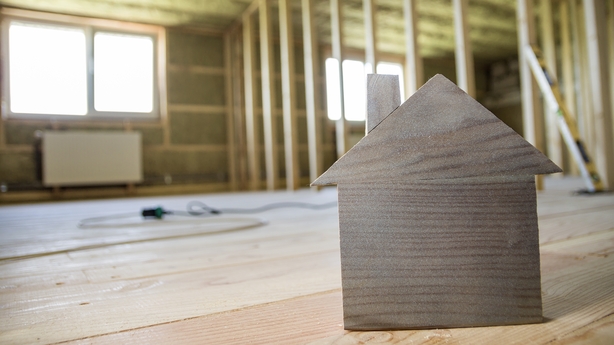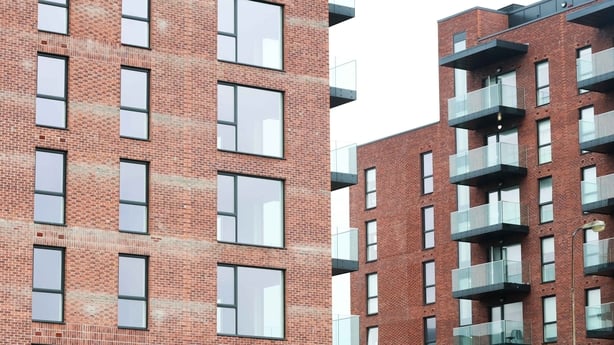It has become one of the hottest political topics across Europe, but one that the EU as a whole has not got involved in.
Housing - and the lack of affordable places to live - is an issue exercising voters from Athlone to Amsterdam, from Limerick to Lisbon.
It came to the fore in local, national and European elections last year.
Even though the European Union has no legal powers in the area, it now realises the need to be more proactive - especially if it to be relevant to younger citizens.

A look at the statistics shows that the issues in Ireland are not unique.
Across the EU prices have risen by an average of 48% between 2015 to 2023. Ireland is well above average at 69%.
However, the increases have been greater in Portugal at 105%, the Netherlands at 83% and Belgium at 86%. The highest house price increase has been in Hungary at 172%.
But the increases are still big in Ireland compared to France - where prices have risen by 31%, Spain by 47%, and Italy by 8%.
The issue most acutely effects younger people with a growing number still living at home.
The average age for Europeans leaving their parental home is 26.
It's older than average in Ireland at 28th and highest in Spain, Italy and Bulgaria where people are now not leaving the family nest until the age of 30.
France is far lower at age 23, with the youngest being Sweden and Finland where people leave home at 21.
Tentatively getting involved
The EU has been tentatively getting more involved. However, it is still unclear what exactly it will do in practice. For the first time there is a Housing Commissioner, Dan Jørgensen from Denmark.
The European Parliament has, for the first time, set up a special housing committee which will have a year to look at solutions and publish recommendations in 2026, just in time for Ireland’s presidency of the EU.
There had been some hope in the European Parliament this week that the Commission would give a greater commitment to begin work on a plan to improve housing affordability across the bloc.
A leaked version of the Commission’s Work Programme for 2025 - which essentially sets out its priorities for the year - committed to setting up an affordable housing initiative.
But that commitment was missing, and the language around housing was watered down significantly, when the final document was presented to the European Parliament.
The final programme said: "Recent crises have challenged the EUs highly treasured social model, by impacting on the cost of living and housing."

However, it excluded a promise in the earlier draft on a "strategy on housing construction to boost supply".
Asked by MEPs why the language was changed, Commissioner Maroš Šefčovič said the Commission will be "engaging stakeholders with a view to bringing forward an affordable housing scheme next year."
This, he claimed, "would have a real impact on the ground".
Fine Gael MEP Regina Doherty is a vice chair of the Parliament’s Housing Committee and said the Commission will have to come forward with a detailed plan.
She has suggested measures that would include "unblocking European bureaucracy", more funding from EU social funds to build homes, and easing financing rules for builders.
"Years ago, in Ireland you would have seen small or medium size builders having two three or four sites on the go at any one time - 30 houses here, there and everywhere. Because of the funding rules that is no longer happening," she said.
Ms Doherty added: "They are literally building five houses at a time and that is really stifling. We need to look at those rules and adapt them so we can scale up."
No-fault eviction ban
Labour MEP Aodhán Ó Ríordáin is also on the Committee and suggested that tenants’ rights could be brought under EU Consumer Protection laws - where the EU does have competency (which incidentally falls under the remit of the Irish Commissioner Michael McGrath).
This, he said, would allow for an EU wide no-fault eviction ban.
"Many of my colleagues from France and Belgium and Germany, that is something that is part of their culture, a no-fault eviction is nothing new to them.
"Even MEPs who are renting apartments in Brussels know they have more rights as tenants than they would do as parliamentarians or as renters in Dublin," he said.
Mr Ó Ríordáin added: "So, trying to bring that mainstream culture of tenants’ rights to the Irish culture would mean we would have less of a stream of people coming into homelessness."

Sinn Féin believes that the EU’s fiscal rules - introduced in the aftermath of the financial crash - should be eased to allow member states to increase their budgetary spending to build houses.
The party’s MEP Kathleen Funchion pointed out that the Commission President, Ursula von der Leyen, has suggested easing fiscal rules to allow defence spending.
"Why can’t there be the same attitude when it comes to investing in housing?" she asked.
But for many MEPs the issue goes far deeper than just ensuring people can afford a roof over their head.
"One of the things that came up during the European election campaign is that people saw the European Parliament as disconnected and not really relevant in their day to day lives.
"So I think it has to get to grips with the issues that area really important," Ms Funchion said.
Fianna Fail’s MEP Billy Kelleher claimed the problems are complex, but a solution is vital.

"If we don’t resolve the issue, we are not only undermining society, the entirety of the European Union is put under risk.
"Because it encourages people to look for the extremes, if you take away the hope or aspiration of owning a house or even renting a house," he said.
Mr Ó Ríordáin agreed, saying "we are facing an existential crisis".
"The institutions are under massive strain. There is a rise of the right, there are 200 extreme right MEPs here in the European Parliament."
He added: "They are focusing on issues that are affecting people and blaming others. The EU - from a socially democratic point of view - has to be a vehicle for improving people’s lives."
"If Europe is not seen to respond to the issues that citizens have then it is remote and not important to the daily lives of citizens and therefore it won’t survive."

